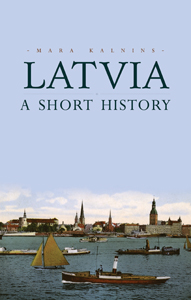Thirty years ago the peoples of Estonia, Latvia and Lithuania signalled the dissolution of the Soviet Union’s hegemony over eastern Europe in a dramatic event that was televised across the globe: on the 23rd of August 1989, two million men, women and children joined hands to form a living chain that stretched 600 kilometres, linking Tallinn, Riga and Vilnius, and sang their way to freedom. That ‘Singing Revolution’ and the achievement of independence on 18 November 1989, 30 years ago today, also marked the end of nearly 800 years of occupation for these Baltic nations which, apart from a brief period of sovereignty between the two World Wars, had been ruled by successive European powers that denied them political enfranchisement. That they were able to preserve their ancient languages and cultures, despite efforts by their conquerors to eradicate both, must be one of the most extraordinary sagas in European history. My book Latvia: A Short History traces the genesis and growth of one nation, the Latvians, their endurance over centuries of oppression, the process by which they achieved their independence, and the place of their nation-state as a member of the European community today.
The history of the Latvian people begins some four and a half millennia ago with the arrival of the proto-Baltic Indo-Europeans to northern Europe. One branch of these migrants reached the Baltic coast and coalesced into a community that evolved a distinctive and remarkably robust culture and language. Over time it developed into a loose federation of tribal kingdoms that stretched from the shores of the Baltic Sea to the upper Dniepr river. But these small, independent kingdoms were unable to resist the later invasion of the Teutonic Knights with their advanced weaponry in 1201 – an invasion that initiated an era of helotry for the Latvian tribes in their ancestral domains. Henceforth an unbridgeable chasm would divide them from their invaders. Whether the foreign power spoke German or Latin (or in the following centuries Polish, Swedish or Russian), on one side stood the conqueror, on the other the native people who clung with ever-increasing tenacity to the one thing the invader could not destroy – their ancient language and the customs and world-view that it embodied. This in turn preserved a powerful sense of identity which informed and gave impetus to the rise of national consciousness in the nineteenth century and the political activities of the twentieth which brought the modern nation-state of Latvia into being.
Today Latvia’s flourishing economy is firmly integrated into the European Union: its political sovereignty is guaranteed by NATO and the United Nations, and the nation is free, as never before, to celebrate its heritage and to nurture the homeland that gave rise to it. In less than two decades, Latvia achieved the remarkable feat of effecting a transition from the closed economy and political stagnation of a Soviet state to a western free market economy and a stable political system in line with the tenets of western democracy. Its capital, Riga, once a premier Hanseatic town and later one of the great Enlightenment cities, is once again a hub of commercial activity with a cosmopolitan population. The city became European Capital of Culture in 2014 and in the same year Latvia entered the eurozone. One of the country’s greatest assets is the number and variety of pristine ecosystems which in 2012 achieved the highest international rating for environmental performance. This emphasis on preserving the natural habitat should come as no surprise, for the landscape was, and continues to be, a powerful integrating factor in the nation’s identity and sense of itself.
In recent years there has been considerable debate about the nature of nationalism, from the near-universal international support for the nationalist and populist uprisings of the late twentieth century to the more negative senses these terms have acquired in contemporary political discourse. Indeed, it has been suggested that the age of romantic nationalism has ended, that the future lies with the great superpowers which control our ever more tightly knit global economy. This may well be the case. Yet history has shown that empires – whether political, religious or economic – which seemed eternal to those who lived in them, have vanished, and that it is the creative diversity and vigour of national cultures and languages that have survived. It may be argued with equal cogency that the future health of the world and its peoples, no less than the health of the biosphere which is now threatened with mass species extinction, depends on preserving that human diversity.

Latvia: A Short History by Mara Kalnins
Paperback | April 2015 | £17.99 | 9781849044622 | 224pp